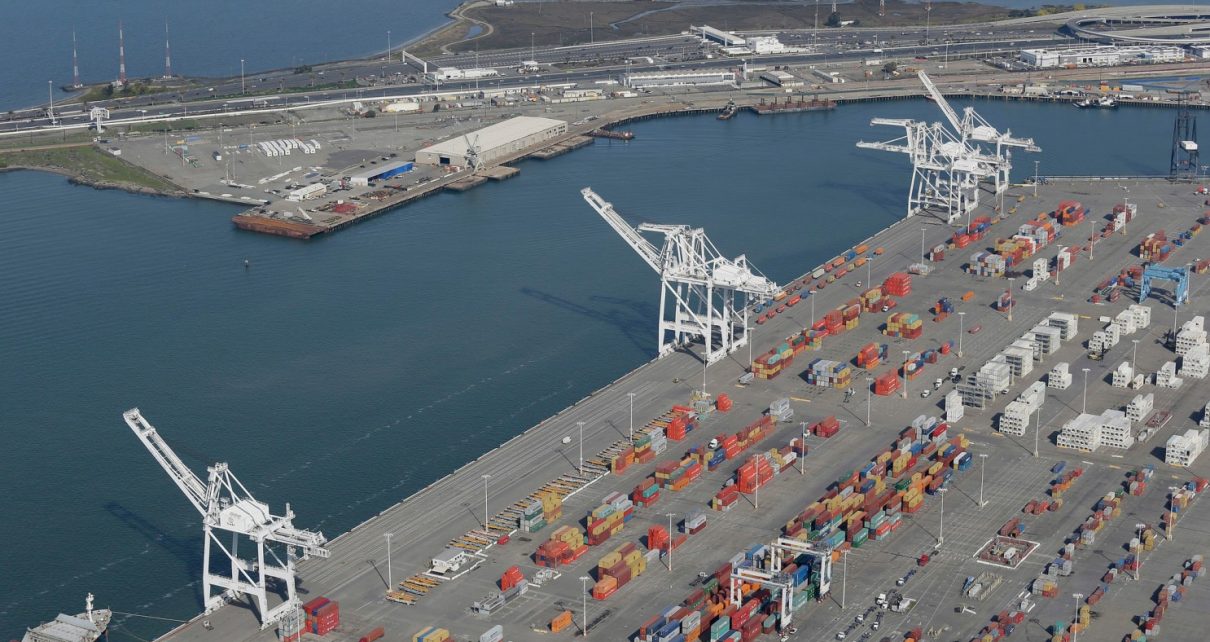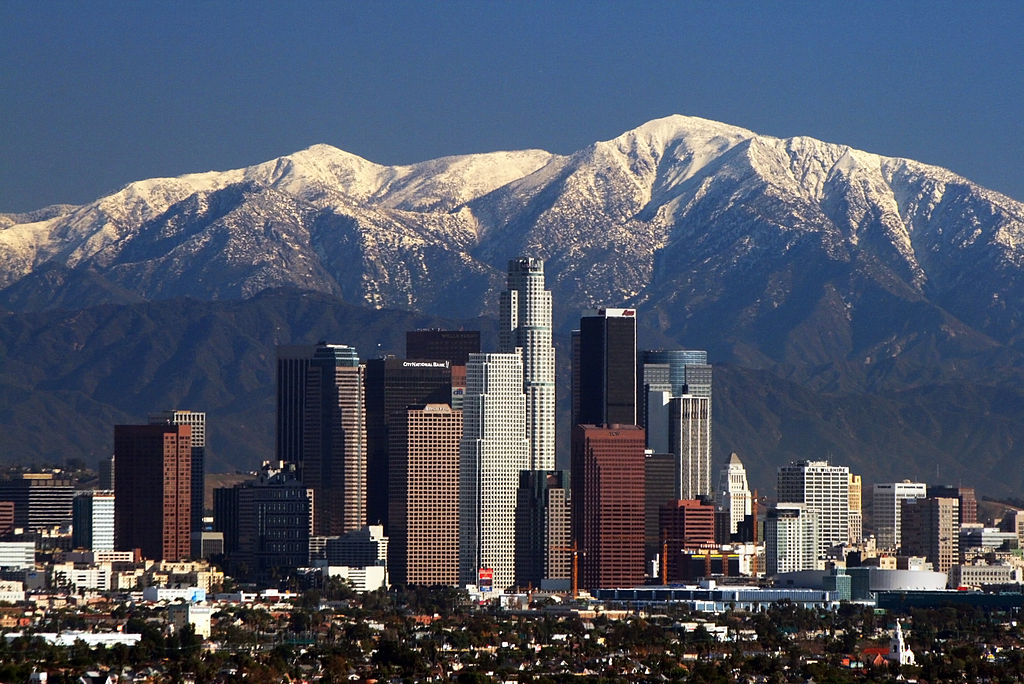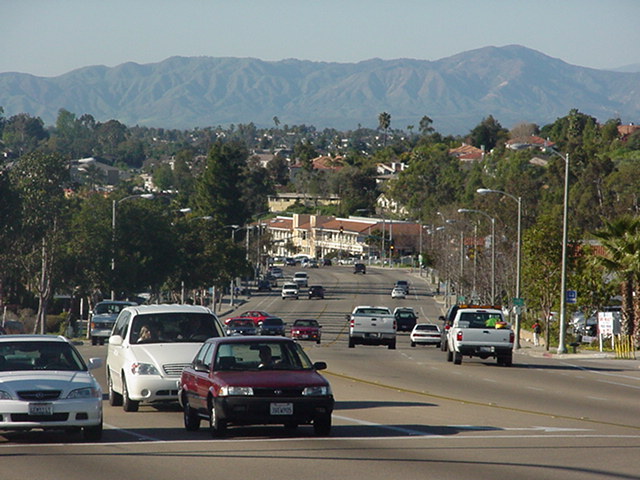
Port of Richmond (Photo: Wikipedia)
Utah Joins Coal Shipping Lawsuit Against City of Richmond
Without the port, coal companies would face not only bankruptcy, but shutting down altogether
By Evan Symon, January 11, 2021 3:07 pm
On Monday, the state of Utah officially joined a lawsuit started by Wolverine Fuels against the city of Richmond over an ordinance that is set to phase out all coal and coal byproduct storage in Richmond.
For many years, Richmond had been one of the few West Coast ports willing to store and ship coal and coal byproducts such as coke from its port. Other ports are either not large enough, don’t have the necessary facilities, have stopped such shipping, or are not properly linked up with a rails. Utah coal has been sent to Richmond’s Levin-Richmond Terminal by rail each year for export to Japan for utility purposes.
However, in the late 2010’s, Richmond residents began complaining of coal dust coming into the city from the port, piles of coal sitting by the docks, and other environmental factors harming them. This led to an ordinance being passed in January of 2020, ordering a three-year phaseout of coal storage at the port. While some residents were upset that the move could lose port jobs as removing coal directly from train cars to ships would take too long to be practical, the promise of shipping other materials, as well as most residents being in favor of better environmental controls won out.
Utah coal companies, which had been closely following the ordinance and threatened to sue if it was passed, and the state of Utah, immediately brought forth plans to sue, with the state even allotting $500,000 to help fund lawsuits against Richmond. Without the port, coal companies would face not only bankruptcy, but shutting down altogether. Utah also had much to lose, including hundreds of mining jobs and at least $4 million in taxes each year coming in. Utah further says that this money goes directly to job growth, infrastructure, and education.
“In addition to supporting and fulfilling important national policies and priorities, the Levin Terminal sustains a significant component of Utah’s economy, provides millions of dollars in annual tax revenue, enables the State to provide critical state and local infrastructure programs, and supplies thousands of high-paying jobs to its rural counties,” the state of Utah said last year in court documents. “If the Ordinance is enforced, the resulting economic loss to Utah would be substantial. Utah depends heavily on a severance tax on coal to fund public education and critical infrastructure.”
Wolverine eventually introduced lawsuits last year, with Richmond immediately filing motions to dismiss the suits. They were rejected at the District Court level by judge Yvonne Gonzalez Rogers, but did allow both Utah and the Sierra Club to intervene. In an amicus brief, the state of California also sided with Richmond.
“Levin and Wolverine claim that if the Levin-Richmond Terminal is not available, coal exports to Japan may need to be shipped from terminals as far away as Mexico,” said Judge Rogers in her ruling. “The Court finds plaintiffs have adequately alleged a significant burden on the interstate markets for coal and petcoke.”
By November, with Richmond one of the two ports left on the West Coast willing to ship coal after Oakland’s continued attempts to block coal from being shipped and Washington State refusing to build a new coal loading terminal, indications by both sides showed a large lawsuit was coming. Some companies putting up lawsuits were even going bankrupt due to reduced US demand but being blocked from sending out coal from West Coast ports, and another California court even tossed out one of the coal companies lawsuits.
This led to Wolverine’s lawsuit to be heard later this year, with Utah formally backing it.
Environmental pollution, Commerce clause violations come to a head
But now with Oakland’s project likely ended for good due to more coal company bankruptcies, Utah and Utah coal companies have put all their effort on keeping Richmond open, as their only other option beyond that is trying to ship out of Mexico.
“This is a slander on Utah,” noted Utah state Senator David Hinkins (R-Orangeville). “If they stop coal, then what’ll they stop next? We could stop California’s oranges going through Utah.”
In the lawsuit, they are claiming that Richmond is violating the Commerce clause of the Constitution as it effectively stops free travel.
“Through its passage of the Ordinance, Richmond has made itself a gatekeeper for interstate and international commerce based on what it alone concludes are good public health and environmental policies, all in violation of the Commerce Clause of the United States Constitution,” stated Utah’s attorney general’s office last year. “This gatekeeping by Richmond severely affects state and local economies in the State of Utah, as well as the state and local infrastructure programs supported by revenue received from Utah’s coal economy.”

Meanwhile, the city of Richmond, backed by California and environmental groups like the Sierra Club and San Francisco Baykeeper have said that the pollution is only getting worse. According to the Census Bureau, coal exports coming through Richmond have shot up from 120,000 tons being shipped in 2016 to 738,000 tons shipped in 2019, owing to more ports closing off coal exports.
“The fossil fuel industry decided they didn’t like that ban and challenged it in court. So now all of us are in court defending that ban,” San Francisco Baykeeper Executive Director Sejal Choksi Chugh said. “The coal industry is trying to get more than 11 million tons of coal out of Bay Area ports. And what they’re trying to do is basically make the Bay Area coal country.”
Richmond’s Mayor, Tom Butt, put the situation with the lawsuit and port bluntly in an interview last year.
“It’s costing the city a lot of money,” said Mayor Butt. “If Levin was willing to agree to cease this operation say in seven years, you know, it might take seven years to work through this lawsuit.”
The lawsuit is expected to be heard in federal court later this year. If ruled in favor of Richmond, or the case being dismissed, coal companies will only have until January of 2023 to ship coal out of Richmond.
- Bill to Require Law Enforcement Disclosure if AI Was Used To Help Write Reports - August 7, 2025
- Gov. Newsom Files FOIA Request To ‘Expose True Cost’ Of L.A. Federal Troop Deployment for Anti-ICE Riots - August 6, 2025
- California Redistricting: How Newsom’s Plan Will Demolish Hard Fought GOP Gains - August 6, 2025





They need to figure out how to make transportation, use, and storage safe. Which is what all companies should be doing with chemical transportation.
Thank you Evan